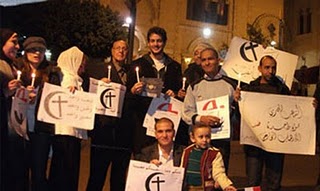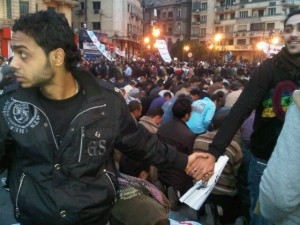Like many of you who read this blog, I have been watching what’s been happening in Egypt avidly. After almost three weeks Mubarak has stepped down after very peaceful protests. The only violence that happened started with the government, not the people. And yesterday when Mubarak said he wasn’t going anywhere, the people did not let their anger lead them to violence, their protesting remained peaceful. The thing that has touched me the most, moved me to tears, is the way that Coptic Christians and Muslims are taking care of each other, and showing the entire world what it looks like to “love your neighbor as yourself.” Or as the Quaran says: “…Do good to parents, kinsfolk, orphans, the poor, the neighbor who is near of kin, the neighbor who is stranger, the companion by your side…” (4:36, emphasis mine).
Here is how Egyptian Muslims and Christians loved their neighbors:
On New Year’s Eve a Coptic Church was bombed in Alexandria, Egypt, killing 21 people. The Copts did not stand alone in their outrage. Their Muslim neighbors joined in and protested with them. On Ahram Online two Muslims made these powerful statements:
“We either live together, or we die together,” was the sloganeering genius of Mohamed El-Sawy, a Muslim arts tycoon whose cultural centre distributed flyers at churches in Cairo Thursday night, and who has been credited with first floating the “human shield” idea.
“This is not about us and them,” said Dalia Mustafa, a student who attended mass at Virgin Mary Church on Maraashly Street. “We are one. This was an attack on Egypt as a whole, and I am standing with the Copts because the only way things will change in this country is if we come together.”
The Cross within the Crescent became the symbol for Egyptians who did not want fundamentalists on either side to define their religions. Muslims promised their Christian brothers and sisters they would attend the Coptic Christmas Eve service (January 8 on the Coptic calendar) and stand as human shields to protect their Christian neighbors. They were as good as their word. Muslims all over Egypt attended mass at Christian churches across the country to show their solidarity, not only with their neighbors, but for peace and safety from terrorist acts. (Thank you to chantblog for bringing this article and picture to my attention.)
Two weeks later Trahrir Square was filled with people demanding democracy: Muslims and Christians gathered against the totalitarian government demanding Mubarak step down, and a democratic government that listened to the people–all of the people–be organized. While his country’s unemployment rate was 30% and the cost of food doubled, Mubarak was sitting on $70-80 billion dollars. Yes BILLIONS, not millions. I can understand why the Egyptians said enough is enough (not to mention being imprisoned and tortured for not pulling the tyrannical line). And we in US we complicit in the dictatorship: we set up Mubarak and supported his regime.We give 1.5 billion dollars a year to Egypt for their military. We were also complicit in the tyranny when our government originally sided with the Mubarak regime to keep “stability” in the region. But that military stayed neutral throughout the protests. They did not attack the protestors nor did they try to make them leave. They stayed on the circumference and only acted if they needed to break something up. If Mubarak commanded them to disperse the protestors, they did not obey. The government shut down the internet in the country because people were using Twitter and Facebook to connect and organize. The people still found ways to organize and gather to protest tyranny.
Last week things did become violent as goon squads were sent out to attack the people. The general belief is that Mubarak and his officials sent the goon squads out to violently disperse the protesters. But the protesters held their ground and fought back. They were not leaving the square. Again the military stayed neutral. They broke apart fights and shot in tear gas when groups started fighting, but they did not take sides.
Friday, February 4, came: the Muslims holy day when this beautiful picture was posted on Yfrog. Nevine Zaki, who was in Tahrir Square, snapped this photo of Christians ringing around their Muslim brothers and sisters, so they could pray safely.
As the Muslims protected them during Christmas Eve mass, now the Christians protected Muslims as they prayed on their weekly holy day.
But that’s not the end of it. On Sunday, February 6, Egyptian Christians held a mass in Tahrir Square and Muslims joined in. According to UPI.com:
Egyptian Christians held a mass of unity in Cairo’s Tahrir Square Sunday to show solidarity with the country’s thousands of anti-government protesters.
Muslim prayers also resounded in the square “in what seemed a show of interfaith harmony” five weeks after a suicide bomber killed at least 21 people at the end of a New Year’s Eve mass in Alexandria, The New York Times reported.
“We are all one,” people began chanting in Tahrir Square after the outdoor Coptic Christian mass was completed.
* * * * * *
Sunday’s mass was “for all Egyptians, Muslim and Christian, and I am proud to be Egyptian today because we are showing the world how important our country is for all the people who live here,” a 33-year-old Christian identified as Farid told the Egyptian news Web site Bikya Mass after the liturgy was completed.
The CopticNews.org, a Canadian site, posted this video from Sunday’s Mass at Tahrir Square, 2/6/11. (I can’t get the video to embed.)
Anticipation built this week as it appeared Mubarak was going to step aside. Then Mubarak spoke Thursday. It was one of the most patriarchal, clueless speeches, I think I’d ever heard. Mubarak made himself out as the old-style patriarch who ruled the entire family with an iron fist. His general message was: “I am your father, and you are my children. Obey me or suffer.” Mubarak was so out-of-touch with the rest of Egypt that he thought all he had to do was play the old-time paterfamilias/ruler, and the people would just go home. Instead they erupted in angry shouts of “Leave! Leave! Leave!” They marched on the palace and the state’s TV station. More people came. The people weren’t going anywhere until Mubarak was gone. And once again the people didn’t get violent. The protesters stayed peaceful. Personally I think Mubarak was trying to goad them to violence, so he could unleash the military on them. The people did not take the bait. Today Mubarak stepped down, and those thousands of people who stood their ground peacefully and demanded a democratic government are celebrating in Tahrir Square and across Egypt.
Myths have been busted in Egpyt. The myth that Arabs/Muslims always resort to violence to change government is gone. The myth that there has never been a peaceful protest or change of government in the Middle East is gone. The myth that Muslims and Christians are enemies, and that Muslims always terrorize and murder Christians in Muslim nations BUSTED. And this myth was busted on the global stage. In Egypt we saw Muslims protecting Christians as they worshiped. In Egypt we saw Christians protecting Muslims as they worshiped. In Egypt we saw Christians and Muslims worshiping side by side, and standing in unity and solidarity to make their country a better place.
This is what it looks like to “do good to the neighbor who is near of kin, the neighbor who is stranger.” This is what loving your neighbor as yourself looks like in real life. This is what loving your neighbor as yourself looks like in oppressive regimes where doing the right thing is, not only hard, but deadly. This is what Jesus was talking about when he told the parable of The Good Samaritan to illustrate “who is my neighbor?” It’s easy to give empty lip-service to loving our neighbors, but this is what it looks like when the rubber hits the road. This is what it looks like when it’s not easy, but you do it anyway.
“Love your neighbor as yourself.”
“Do good to the neighbor who is near of kin and the neighbor who is stranger.”


Pingback: Customer Love Means Loving Yourself First » Shawna R. B. Atteberry
This is exactly what Christ was talking about. This is a great example of showing Christ’s love for others.
More than anything, this proves the power of love beyond a doubt. When we truly love one another, with courage and selflessness, we can do anything.
And when we stop believing the lie that people who are not like us are somehow less or threatening, we double, triple, quintuple our power – because then we can all act together instead of fighting each other. I believe that lie is perpetuated deliberately by those who wish to rule.
Egyptians have become a powerful example of what love can do.
I absolutely agree with you LaVonne.
Pingback: Tweets that mention Egypt: What the love Jesus talked about looks like on the ground » Shawna R. B. Atteberry -- Topsy.com